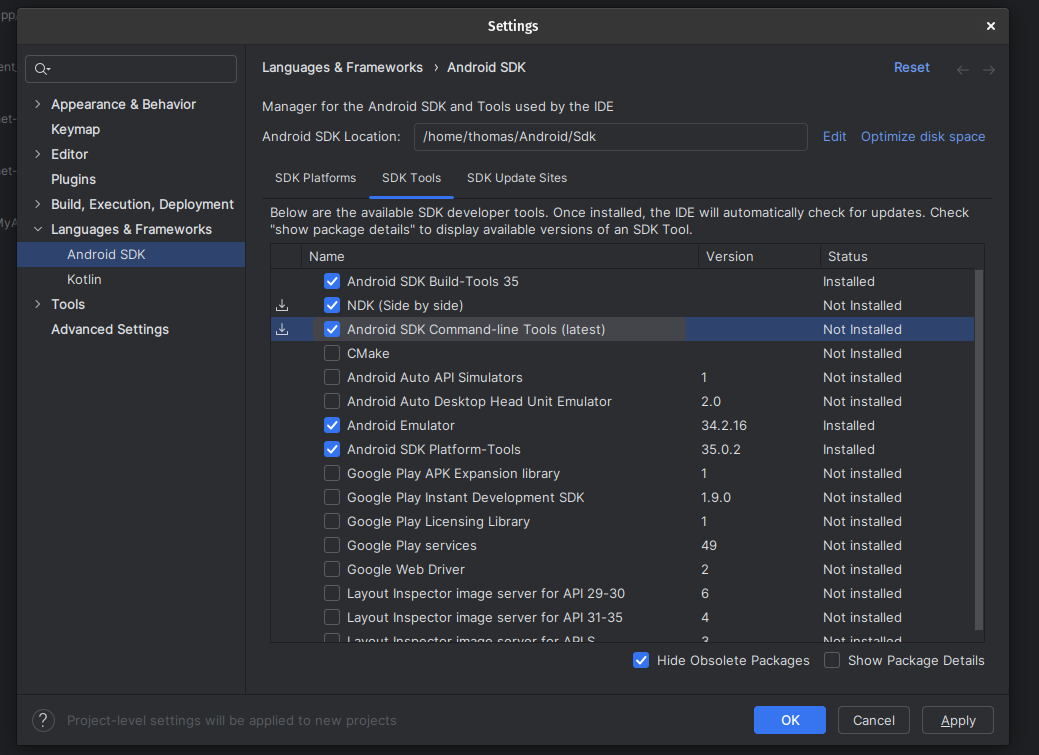Rust In Android
Because there are a lot of starknet libraries in rust, and the beerus client is written in rust, being able to run rust code on android is important for reaching MVP.
The process for running a minimal rust "hello world" library on android is as follows:
Get dependencies
Install NDK from android studio

Add rust dependencies
cargo install cargo-ndk
rustup target add x86_64-linux-android
Update Cargo.toml
[lib]
crate-type = ["cdylib"]
[dependencies]
jni = "0.21.1"
Implement the Java side
We will be creating a Java class to interact with our rust library as follows:
package com.example.rust_example;
public class RustLib {
// define the interface for using the rust library below
public static native String hello(String input);
static {
// here we load the rust library we created
System.loadLibrary("example_rust_project");
}
}
Writing the rust side
We will write rust code that compiles as C code to match the C header generated when compiling the Java library created in the previous step. Use javac to compile the Java class into a C header.
javac RustLib.java -h .
The output is shown below:
/* DO NOT EDIT THIS FILE - it is machine generated */
#include <jni.h>
/* Header for class com_example_rust_example_RustLib */
#ifndef _Included_com_example_rust_example_RustLib
#define _Included_com_example_rust_example_RustLib
#ifdef __cplusplus
extern "C" {
#endif
/*
* Class: com_example_rust_example_RustLib
* Method: hello
* Signature: (Ljava/lang/String;)Ljava/lang/String;
*/
JNIEXPORT jstring JNICALL Java_com_example_rust_1example_RustLib_hello
(JNIEnv *, jclass, jstring);
#ifdef __cplusplus
}
#endif
#endif
Now we implement this C header in rust.
#![allow(unused)] fn main() { use jni::{ objects::{JClass, JString}, sys::jstring, JNIEnv, }; use super::hello; #[no_mangle] pub extern "C" fn Java_com_example_rust_1example_RustLib_hello<'local>( mut env: JNIEnv<'local>, // this is the class that owns our static method _class: JClass<'local>, input: JString<'local>, ) -> jstring { // getting the input string from our android app out of java let input: String = env .get_string(&input) .expect("Couldn't get java string!") .into(); // creating a new java string to return to our android app let output = env .new_string(hello(&input)) .expect("Couldn't create a java string!"); output.into_raw() } }
Building for android
Run
make build-android
Copy the .so file from 'target/x86_64-linux-android/release/libexample_rust_project.so' to 'app/src/main/jni/x86_64/libexample_rust_project.so' so the android app can read compiled native code.
Use the library like any other library.
package com.example.rust_example
import androidx.appcompat.app.AppCompatActivity
import android.os.Bundle
class MainActivity : AppCompatActivity() {
override fun onCreate(savedInstanceState: Bundle?) {
super.onCreate(savedInstanceState)
setContentView(R.layout.activity_main)
val result = RustLib.hello("TEST")
println(result)
}
}
Add the following to your build.gradle file to link the library:
sourceSets {
named("main") {
jniLibs.srcDir("src/main/jni/")
// Configure the JNI libraries directory
// Note: For newer configurations, JNI libraries are often managed differently
// Check your specific plugin version's documentation for precise configuration
}
}